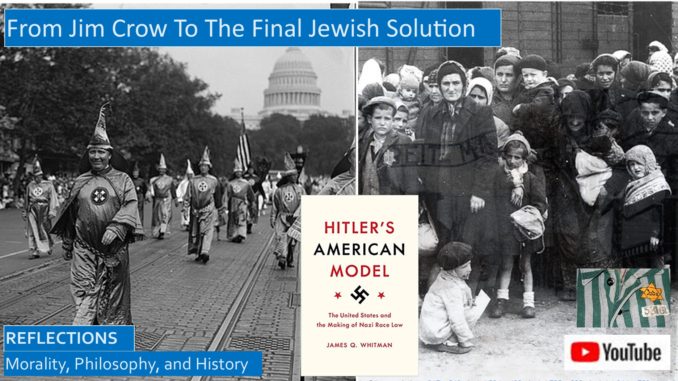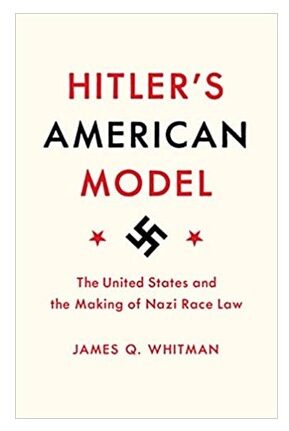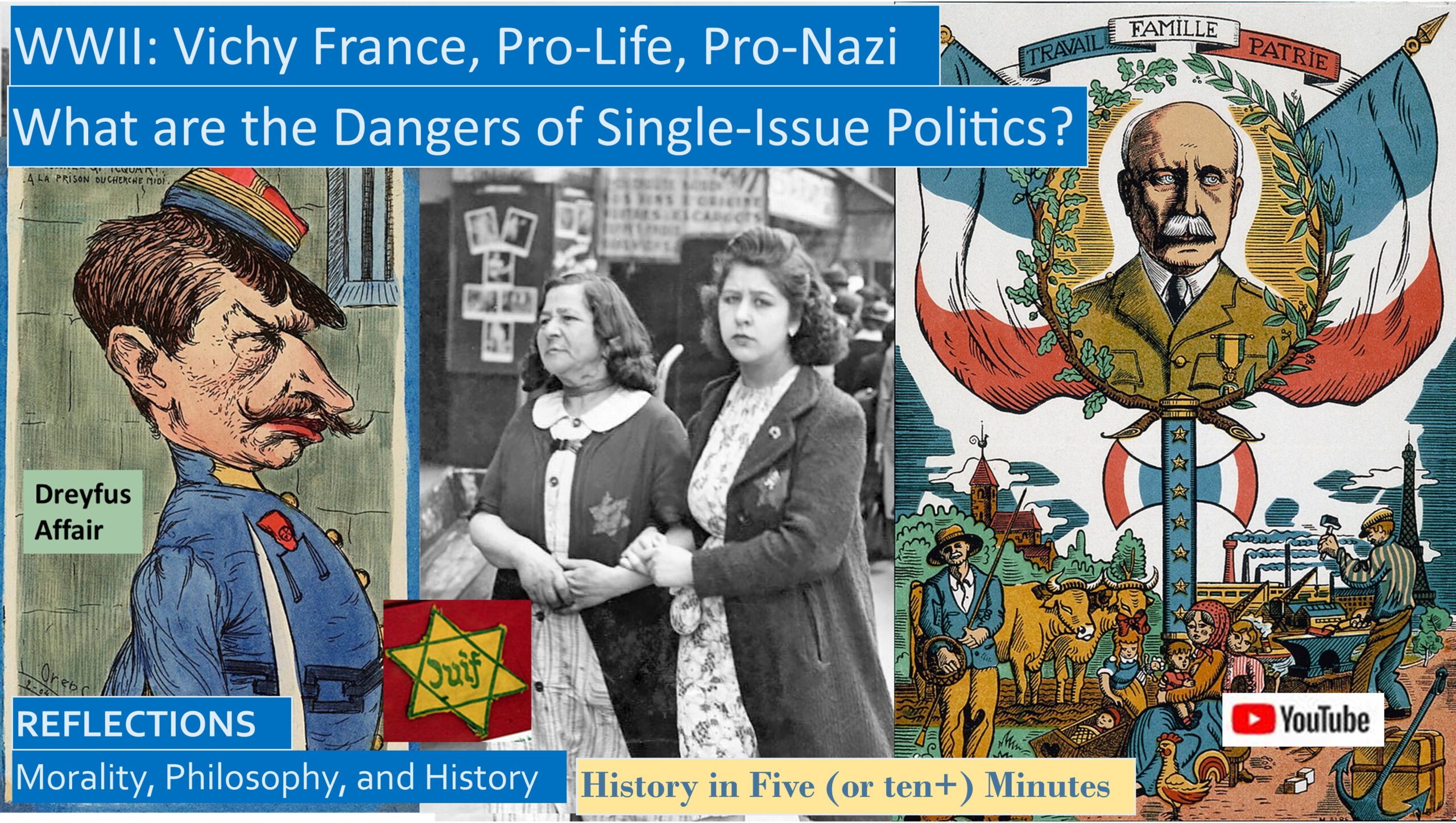
James Whitman says in his introduction to Hitler’s American Model:
“The Nazis were not simply demons who erupted out of some dark underworld to shatter what was good and just within the Western tradition, until they were put down by force of arms and the authentic humane and progressive values of Europe were restored. There were traditions of Western governments within which they worked. There were continuities between Nazism and what came before and after. There were examples and inspirations on which the Nazis drew, and American race law prominent among them.”[1]
Hitler’s rants in his Mein Kampf reveal that the elevation of the Aryan race was central to the Nazi ideology, and that the perfidious Jews were the cause of the Germans’ woes, their stabbed-in-the-back defeat in World War I, the humiliation of Germany, the Depression that hit Germany, they were to blame for every tribulation that Germans suffered. The Jews did not deserve to be citizens, they did not deserve their jobs, they did not deserve their possessions, they did not deserve their family, they deserved only persecution and misery, Jews should either be driven to exile or executed.
This the YouTube video for this topic: https://youtu.be/_td3jPGD5TI
For more book links, view this script: https://www.slideshare.net/BruceStrom1/how-nazi-lawyers-used-jim-crow-laws-in-drafting-the-nuremberg-race-laws-to-persecute-the-jews
Soon after Hitler assumed complete power as Fuhrer the lawyers working in the newly formed Nazi regime went to work drafting the Nuremberg Race Laws, which were passed in 1935. These laws were:
- Reich Flag Law, which enshrined the swastika as the exclusive national emblem of German.
- The Citizenship Law distinguished between those Germans who were simply nationals, under the jurisdiction of the Reich and who owe special duties to the state, and citizens of German blood, who had full political rights as long as they “demonstrated through their conduct that they were willing and suited to faithfully serve the German Volk (or people) and Reich.”
- The Blood Law tried to guarantee the purity of German blood to ensure the continued existence of the Volk, or people. It criminalized marriage and sexual relations between Aryans and Jews and forbid Jews from hiring Germans as servants. Jews were only permitted to display “Jewish colors,” they were forbidden to display the colors of the Reich or the swastika. Mixed marriages were both a civil and a criminal offense.[2]
In the early years of the regime, the Nazis sought to encourage Jews to migrate out of Germany, which meant they had to leave much of their property behind, but during the war years many Jews were shipped to the concentration death and work camps, often in cattle cars, standing room only.
The Nazis did not directly copy the Jim Crow laws, the politics of the two countries differed. The main difference between these two legal systems is that segregation of the races was key to the Jim Crow system, while it is not mentioned in the Nuremberg Race Laws. This distinction would become meaningless when during the war years the German Jews were shipped to the death camps, and when the Polish Jews were first brutally and forcibly segregated into Jewish ghettoes, then these ghettoes were emptied out into the death camps.
There were many American Laws that were similar to the Nuremberg Race Laws. America had have many novel forms of second-class citizenship particularly for blacks, and also for Native Americans, Filipinos, and Puerto Ricans. During World War II our Japanese citizens were forcibly moved into camps where they were treated fairly well, though they lost most of their property and businesses in the process. The Nazis could directly reference Aryan bloodlines and racial purity in their laws, but the Jim Crow laws had to pretend there was an equality so the due process Reconstruction Amendments would not be applied. Miscegenation laws that forbid whites and blacks to marry would not be overturned until the Supreme Court hearing of Loving v Virginia in 1967. The race-based US immigration Laws would not be amended to be race-neutral until the Immigration and Naturalization Act of 1965. America had a long history of race-based immigration laws, beginning with the 1790 Naturalization Act, which permitted the immigration of “any alien, being a free white person.”[3]
REICH FLAG LAW
The Reich Flag Law was passed over anger over the Bremen Incident, where rioters ripped the swastika flag from the German ship SS Bremen while it was docked in New York City, throwing it in the Hudson. The rioters were arrested, then released by the Jewish magistrate Louis Brodsky, who wrote a fiery opinion denouncing Nazism and calling the swastika a “black flag of piracy,” a symbol that rejected everything that America stood for. This decision caused an international outcry that the Nazi propaganda machine took full advantage of. The Reich Flag Law was a Nazi rejection of the American liberal democracy who would empower a Jewish judge to make such a decision.[4]
PRUSSIAN MEMORANDUM
The Prussian Memorandum was circulated by Nazi radicals in 1933 and served as a basis for the Citizenship and Blood Laws. In both this memo and the planning meetings for the law the American Jim Crow models were repeatedly discussed.[5] The memo discusses how shameful it is when German women consort with Negroes, stating this is illegal in the US Deep South.[6] When discussing proper blood lines, the memo refers to “Jewish, Negro, and other colored” peoples.[7]
During the discussions on the memo and the race laws the Nazis revealed their hardline views on segregation. Our author restates their views, “Segregation would simply never succeed in Germany. German Jews, unlike American blacks, were too wealthy and arrogant; the only hope was t hat they be put down by ‘severe criminal punishment.’ Jim Crow segregation was a strategy that could work only against a minority population that was already oppressed and impoverished.”[8]
CITIZENSHIP AND GERMAN BLOOD LAWS
The Nazis found encouragement for denying citizenship to its Jews from the American Deep South that denied to blacks the right to vote through various legal fictions such as literacy tests, poll taxes, grandfather laws, and by pure intimidation by the KKK night riders who lynched and terrorized blacks who dared to try to vote.[9]
The Nazi Supreme Court declared that the Blood Law was a “fundamental constitutional law of the national socialist state.” The German Volk blood could not be mixed, the Citizenship and Blood Laws were imperative to prevent “further penetration of Jewish blood into the bod of the German Volk,” or people. Mixed societies were seen a racially degenerate mish-mash, mixed blood children were seen as mongrels by the Nazis.[10]
The Nazi Blood Laws were the Race Laws that borrowed the most from the United States Jim Crow Laws, which at the time were among the harshest in the world. Thirty-eight states forbid interracial marriages. For example, the Maryland statute at the time forbid marriages between whites and those who were black back three generations, and was a criminal offense, requiring a jail sentence from eighteen months to ten years.[11] Likewise, the Nazi Blood Law was both a civil and a criminal offense.
Who was Jewish? This did not depend on your faith but your blood, you were Jewish if you had three Jewish grandparents, or two grandparents if you were married to a Jew.[12] First, Jewish shops were boycotted, then Jews were fired from their jobs as teachers and civil servants, then the professions. The problem was that since pastors were civil servants, they were considered Jews by virtue of their grandparents even though they had converted to Christianity many years ago.
WHAT NAZIS THOUGHT ABOUT AMERICAN RACE LAWS
Hitler praised the American race-based immigration laws and American white supremacy in Mein Kampf.[13] Hitler lauded the Confederate States for founding the healthy racist order he was trying to create in Germany
The Nazi Dr Mobius remembered what an American said to him, “We do the same thing you are doing. But why do you have to say it so explicitly in your laws?”[14]
Quote from Hitler’s Mein Kampf, “The racially pure and still unmixed German has risen to become master of the American continent, and he will remain the master, as long as he does not fall victim to racial pollution.”[15]
“Hitler proclaimed his admiration for the American conquest of the West, where the Americans had ‘gunned down millions of Redskins to a few hundred thousand.”[16] American treatment of the Indians provided a handy justification for the German conquests in the East in their search for living space, or Lebensraum.[17]
The Nazis balked at the American racial one-drop doctrine, where one drop of negro blood meant you were a Negro, the Nazis thought this was too extreme.[18]
The Nationalist Socialist Handbook of Law and Legislation described “America as the country that had achieved the ‘fundamental recognition’ of the truths of racism, and taken the first necessary steps, now to be carried to fulfillment by Nazi Germany.”[19]
One piece of Nazi literature noted that “the United States, like Nazi Germany, has racist politics and policies. What is lynch justice, if not the natural resistance of the Volk (or people) to an alien race that is attempting to gain the upper hand? Most states of the Union has special laws directed against the Negroes, which limit their voting rights, freedom of movement, and career possibilities.”[20]
KRISTALLNACHT AND THE ANTI-LYNCHING BILL
The Nazis on the night of the Kristallnacht, or night of broken glass, greatly increased their persecution of the Jews by burning, looting, and vandalizing Jewish businesses, synagogues, and residences, and soon after sent most Jews to their deaths in the concentration death and work camps. This same type of violence had been practiced in the Deep South by the KKK and other racist terrorists, likely tens of thousands of Negroes had been lynched in the years since the end of the Civil War in the Deep South and mid-West.
Mine eyes were opened when I first read about the history of the defeat of the anti-lynching bill in 1938. Eleanor Roosevelt and the black leaders were pushing FDR and Congress to pass the anti-lynching bill when the entire world was witnessing the horrors of the Nazi persecutions of the Jews. FDR was sympathetic, he explained to a colleague that “the southerners by reason of the seniority rule in Congress are chairmen of the key Congressional committees. If I come out for the anti-lynching bill, they will block every bill I ask Congress to pass to keep America from collapsing. I just can’t take that risk.” So, FDR had a choice, he could fight the Nazis, or he could fight lynching, but he could not do both. And, defeating the Nazis was an attainable goal.
Eleanor persisted in public speeches and her newspaper column in support of the anti-lynching campaign, constantly badgering her husband. Once she asked FDR, “Do you mind if I say what I think?” FDR replied, “You can say anything you like. I can always say, ‘Well, that is my wife; I can’t do anything about her.’” This supposed conflict was a good political way to push for civil rights without unduly antagonizing the powerful Deep South Senators and Congressmen.[21]
What is distressing about this history was that the bill was not against lynching itself, but it put legal pressure on Southern judges and policemen to enforce the law and punish those who were guilty of lynching, instead of just ignoring the crime.
Our main blog on how Christians lived under a Nazi regime:
http://www.seekingvirtueandwisdom.com/christians-under-hitlers-german-nazi-regime/
[1] James Q Whitman, Hitler’s American Model, Introduction, p. 15.
[2] James Q Whitman, Hitler’s American Model, pp. 18-19, 29-32..
[3] James Q Whitman, Hitler’s American Model, pp. 32-34.
[4] James Q Whitman, Hitler’s American Model, pp. 18-21.
[5] James Q Whitman, Hitler’s American Model, p. 76.
[6] James Q Whitman, Hitler’s American Model, p. 86.
[7] James Q Whitman, Hitler’s American Model, p. 124.
[8] James Q Whitman, Hitler’s American Model, p. 99.
[9] James Q Whitman, Hitler’s American Model, p. 39.
[10] James Q Whitman, Hitler’s American Model, pp. 73-74.
[11] James Q Whitman, Hitler’s American Model, pp. 78-79.
[12] James Q Whitman, Hitler’s American Model, p. 130.
[13] James Q Whitman, Hitler’s American Model, p. 12, 71.
[14] James Q Whitman, Hitler’s American Model, p. 73.
[15] James Q Whitman, Hitler’s American Model, p. 17.
[16] James Q Whitman, Hitler’s American Model, p. 47.
[17] James Q Whitman, Hitler’s American Model, pp. 115-116.
[18] James Q Whitman, Hitler’s American Model, p. 127.
[19] James Q Whitman, Hitler’s American Model, p. 160.
[20] James Q Whitman, Hitler’s American Model, p. 65.
[21] Doris Kearns, No Ordinary Time, pp. 163-164.






6 Trackbacks / Pingbacks